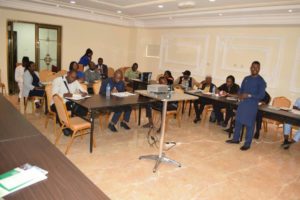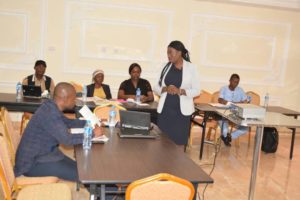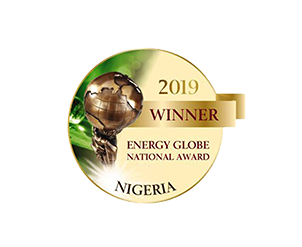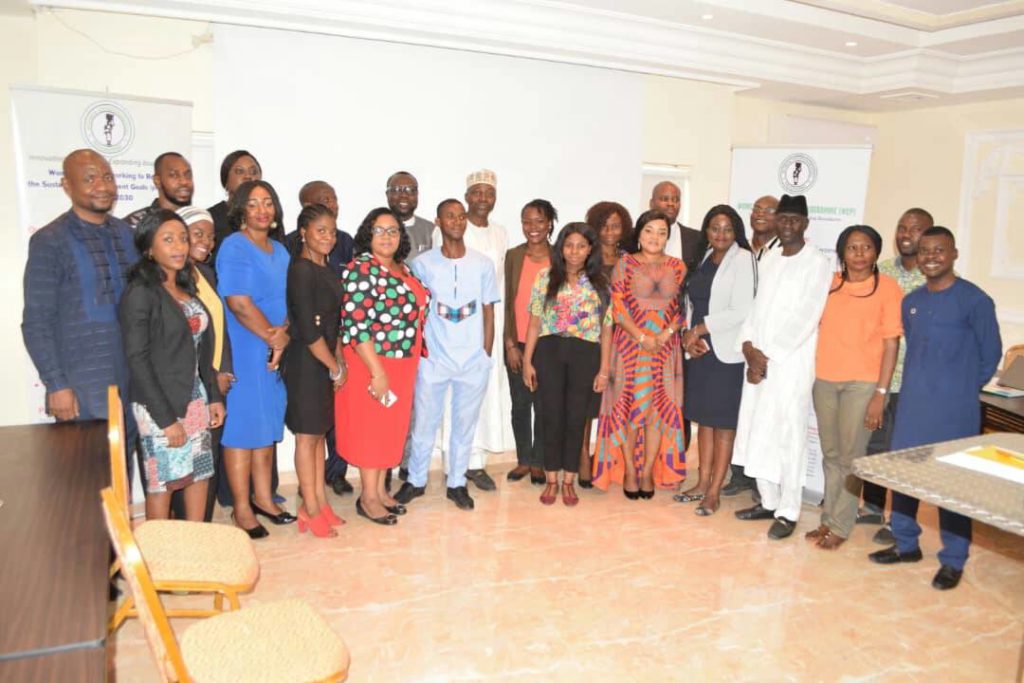
POLICY CONSULTATION ON SDGS IN NIGERIA
Women Environmental Programme (WEP), on 27 June, 2018 at The Consort Luxury Suites, Plot 799 Kaura District, Abuja, organized a policy consultation on the Sustainable Development Goals (SDGs).
This policy consultation was part of the activities of the Women2030 project, which created a platform for different stakeholders to discuss Nigeria’s SDGs’ plans, policies and programmes, and make necessary recommendations that will help the country realize the SDGs. Stakeholders at the event were drawn from the Ministries, Departments and Agencies (MDAs) of government, private sector, Civil Society Organizations (CSOs) and the media.
The Keynote address at the event which was titled: “Funding Implementation of SDGs in Nigeria,” was presented by the Senior Special Assistant to the President on Sustainable Development Goals (SSAP SDGs), Princess Adejoke Orelope-Adefulire, who was represented by Mr. Yahaya Hamza. Princess Adejoke explained to the participants the different funding sources available for the implementation of SDGs in Nigeria. She also highlighted the strategies employed by her office as well as the different programmes being implemented by the office towards achieving SDGs.
According her, the funding sources for implementing SDGs in Nigeria are: “Funding from Annual Budgets: Through partnership with Ministry of Budget and National Planning, SDGs are mainstreamed into long term and medium term development plans e.g. the SDGs core areas such as energy, food security, agriculture, infrastructural development, industry, macroeconomic stability and inclusive growth have been integrated into the National Economic Recovery and Growth Plan (NERGP). At the sub-national levels, the SDGs are being mainstreamed into State development plans. The MDAs align these sectoral plans with the annual budget and work plan for resource allocation and implementation.
Debt Relief Gains: The Debt Relief Gains (DRG) is a robust financing strategy that emerged when Nigeria obtained debt relief from the Paris Club of Creditors. The DRG funds were administered by the then Office of the Senior Special Assistant to the President on MDGs and was utilized to scale up high impact pro-poor interventions geared towards achieving the MDGs. Unfortunately, the DRG funds are not available for now but the SDGs Office is strongly advocating at relevant quarters, for the reintroduction of the DRG funds for SDGs interventions and activities.
The Conditional Grants Scheme: The Conditional Grants Scheme (CGS) was introduced in2007 as a vehicle for fostering inter-governmental collaboration towards scaling up efforts for achieving the MDGs. To prioritize the SDGs implementation at the sub-national levels, this innovative financing framework has been adopted. The CGS is being used to incentivize the domestication of the SDGs and will leverage investments from the sub-national governments through an equal; counterpart contributory arrangement that ensures high impact interventions in the social, economic and environmental aspects of development is delivered to poor rural communities.” Other sources she said include: The United Nations Development Assistance Framework and the Green Bonds.
After the Keynote address, participants were taken through the 17 goals and the 169 targets and how the SDGs could be mainstreamed in policies and programmes of organizations by Linda Akpami, Environment Consultant.
This was followed by the presentation by WEP on the preliminary results of the assessment she carried out on specific goals and targets of the SDGs in 11 states of Nigeria: Lagos, Delta, Rivers, Anambra, Benue, FCT, Nasarawa, Plateau, Kano, Yobe and Katsina. The assessment sought information against the following SDGs and targets: Goal 1, targets 1.2 and 1.4; Goal 4, target 4a; Goal 5, target 5.5; Goal 6 targets 6.1 and 6.2; Goal 7, target 7.1; and Goal 13, target 13.2. However, only the quantitative results for goals 1,4, 5, 6 and 7 were presented at the policy consultation.
The result of the assessment revealed the following:
- High poverty rates across the states assessed as income levels of respondents with highest percentage fell within the income category of N1-N10,000 which translates to the fact that most respondents live on less than 1 USD a day.
- Many schools assessed had no infrastructure for equitable and quality education: Apart from FCT, less than 50% of schools in the other states had computers for use by teachers, pupils/students. Averagely, 90% of schools assessed had no infrastructure and materials adapted to the needs of children with disabilities. Similarly, many schools had no electricity, drinking water sources, toilets, and handwashing facilities.
- Major drinking water sources of respondents were found to be borehole, sachet water and wells across all the states as most respondents had no access to public pipe borne water. Similarly, an average of 10% of respondents across all the states assessed had no toilets in their households.
- An average of 80% of respondents had no access to public electricity supply, while over 60% across all the states depended on kerosene, firewood and charcoal as their major sources of cooking energy.
- None of the states assessed had a woman as a governor. The states also had by far, fewer number of women in their Houses of Assembly and as Commissioners than men.
The participants at the consultation proffered the following major recommendations to be implemented if Nigeria must achieve the SDGs by 2030:
- It is important that all the Ministries, Departments and Agencies (MDAs) of the government align their activities with the targets of their relevant SDGs and draw up actionable plans that will be implemented over time to achieve the SDGs targets. Until the MDAs work in line with the set targets of the SDGs, the country will be far from achieving the SDGs at the appropriate time.
- Governments at all levels should ensure all private and public schools are inclusive and have infrastructure for equitable and qualitative education which gives access to education to both the abled and children with disabilities.
- Governments at all levels should increase investment in renewable energy and create an environment that will open doors for more players (local and foreign) in renewable energy sector, thereby making as many communities as possible have access to mini-grids and off-grids energy systems as well as clean and affordable cooking energy.
- Ministries and Agencies of Government responsible for provision of water to the citizens should make concrete plans to ensure more Nigerians have access to portable water by expanding their distribution networks and exploiting more, the abundant water resources in the country for provision of portable water to the citizens.
- Government should commit to implementing the Affirmative Action in the National Gender Policy for more involvement and meaningful participation of women in public decisions. While it is recommended that the Lawmakers translate the Affirmative Action into a law, the Executives should be guided by the National Gender Policy in their appointments so as to achieve gender balance.
